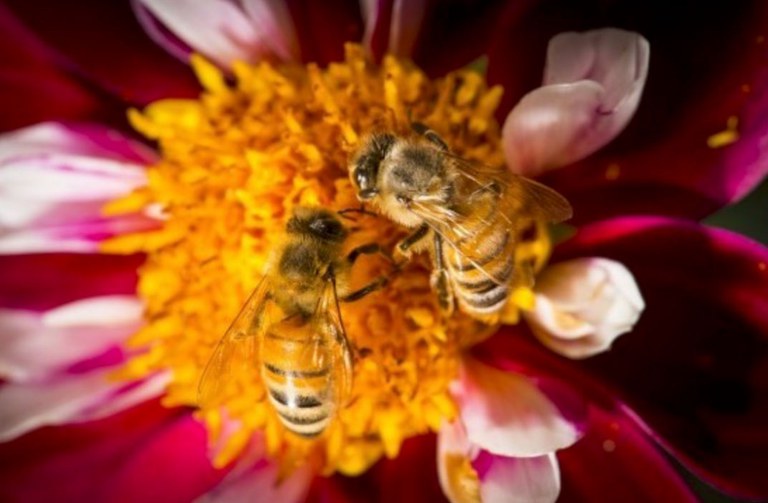Posted: April 11, 2019
North American Pollinator Protection Campaign (NAPPC) Task Force for Honey Bee Health Selects 2019 Research Projects
Diverse Research Funded to Improve Honey Bee Health across the Continent
Six new research projects related to honey bee health issues have been funded by a combination of a USDA APHIS grant and donations from Pollinator Partnership's (P2) generous supporters. Each project will conduct a valuable investigation into an identified priority area that will expound on the issues faced by honey bees in North America.
The Honey Bee Heath Task Force of the North American Pollinator Protection Campaign (NAPPC), co-chaired by Dr. Deborah Delaney, University of Delaware, Dr. Jay Evans, USDA Beltsville Bee Lab, Dr. Olav Rueppell, University of North Carolina-Greensboro, and Dr. Barry Thompson, Estate and Orchard Bee Keeping, LLC, solicits proposals each January from University professors, researchers, and graduate students who provide the latest findings in honey bee genetics, pesticide exposure, nutrition, and management among other areas. Research topics are diverse and aim to support bees and beekeepers.
This spring, the NAPPC Honey Bee Health Task Force convened and expert panel to review the proposals, which included Jay Evans, Ph.D., Danielle Downey, MS, Gloria Degrandi-Hoffman, Ph.D., Vicki Wojcik, Ph.D., Robyn Rose, Ph.D., Olav Rueppell, Ph. D., and Barry Thompson, Ph.D. The committee funded 6 outstanding research projects that will advance the science supporting practical applications in honey bee management and conservation. The following projects have been chosen from many high quality submissions to the NAPPC Task Force and will report their progress at the annual NAPPC International Conference in Washington D.C, October 22-24, 2019:
- Dr. Christina Grozinger at Penn State University is investigating the effectiveness of manipulating pollen macronutrient ratios to improve honey bee resilience to pesticide stress.
- Zachary Lamas at the University of Maryland is focusing on Varroa behavior invading brood cells and the consequences of co-infested cells.
- Dr. Ana Montero-Castaño at the University of Guelph is working to elucidate the role of crop flowers as reservoirs of pathogens and the influence of the pollinator community on pathogen transmission to honey bees.
- Dr. Margarita López-Uribe at Penn State University is researching the breeding for tolerance to Deformed Wing Virus in honey bees.
- Dr. Juliana Rangel at Texas A&M University is quantifying the impact of pesticide contamination in the wax rearing environment on developing honey bee queens.
- Dr. Jacob Wenger at California State University, Fresno is assessing Synthetic Amorphous Silica (SAS) for the Management of Small Hive Beetle (Aethina tumida).
More than 60 donors contributed to the funding of the 2019 Honey Bee Health grants, with the largest funding resulting from a research partnership with the U.S. Department of Agriculture and APHIS with help from National Program Manager, Dr. Robyn Rose. Honey Bee Health Grants have been distributed for the past 12 years, totaling more than $650,000 in research support for 69 research programs in Canada, the United States, and Mexico. Individuals are encouraged to make tax- deductible donations of any amount to help fund these grants by choosing the "Honey Bee Health Research" option at www.pollinator.org/donate or by designating donations for honey bee research. Alternatively, you may contact Kelly Rourke of Pollinator Partnership at kr@pollinator.org or at (415) 362-1137 to become a supporter of the program.
The request for proposals for 2020 research projects will be distributed in November 2019. Visit www.pollinator.org/honeybee-health for more information.
ABOUT THE NORTH AMERICAN POLLINATOR PROTECTION CAMPAIGN (NAPPC)
For over 15 years, NAPPC has brought together stakeholders form all sectors of the pollinator issue in a collaborative partnership to support pollinator health across the North American continent. More than any other single organization, the collective effort of these 160 plus organizations has made pollinator health a feature in conservation landscape management. From its many Task Forces, NAPPC affects change and moves solid science into real progress on the ground. Managed by the Pollinator Partnership, more can be found about NAPPC at www.nappc.org.
ABOUT POLLINATOR PARTNERSHIP (P2)
Established in 1997, Pollinator Partnership is the largest 501(c) 3 non-profit organization dedicated exclusively to the health, protection, and conservation of all pollinating animals. Pollinator Partnership's actions for pollinators include education, conservation, restoration, policy, and research. P2's financial support comes through grants, gifts, memberships and donations from any interested party. Its policies are science-based, set by its board of directors, and never influenced by any donor. To make a donation or for information on events during Pollinator Week, visit www.pollinator.org.


